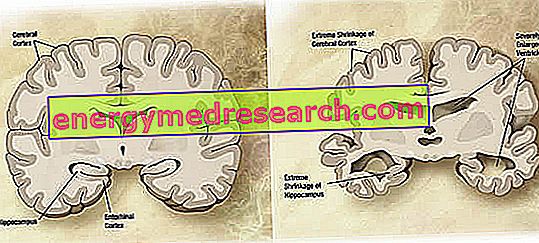Generality
English salt - also known as Epsom salt or epsomite - is a particular type of mineral that is used in various fields, from medical to agricultural.

From the chemical point of view, English salt is magnesium sulfate heptahydrate (MgSO4 ∙ 7H2O). The names attributed to this compound derive from its place of origin, namely the British citizen of Epsom.
English salt was discovered and described for the first time by the French geologist François Sulpice Beudant as far back as 1824.
Please note
Epsom salt has nothing to do with table salt. The name "salt" has been attributed to it because of its chemical structure, since it is - to all effects - the magnesium salt of sulfuric acid.
Features
What features does English Salt have?
English salt is presented in the form of prismatic white crystals, odorless and with a bitter taste. Precisely because of this last characteristic, this compound has also earned the name of " bitter salt ". It is soluble in water and in alcohol.

In nature, English salt occurs in the form of fibrous aggregates, or in stalactitic masses, or even as needle- like crystals .
English salt, therefore, is obtained from natural sources, such as those present at Epsom, in fact. However, the aforementioned British citizen is not the only place where it is possible to find natural aggregates of English salt; in fact, it was also found in California, Slovakia, Russia and Italy.
However, English salt can also be obtained synthetically.
Property
What properties are attributed to English Salt?
English salt is best known for its laxative properties which have been widely demonstrated and confirmed. These, however, are not the only properties attributed to the salt in question. According to many, in fact, taking hot baths with Epsom salt, should promote muscle relaxation, removing tension and pain. Furthermore, warm baths with English salt are attributed the ability to provide relief to irritated skin and to patients suffering from skin diseases, such as psoriasis. However, these hypothetical properties are not supported by adequate scientific studies able to confirm them.
Finally, properly prepared and administered, English salt has been shown to be effective in treating seizures of toxemia and re-establishing normal magnesium levels in the event of a deficiency. These particular properties - confirmed by studies and scientific research - have meant that this salt was part of the composition of real drugs used to treat the aforementioned disorders.
Medical Uses
When English salt is used in the medical field, it can be taken substantially in two ways: by mouth or parenterally.
Depending on the way in which English salt is taken, it is possible to obtain different therapeutic effects.
Oral administration
Taken orally, English salt is used in medicine for its laxative activity . In detail, it behaves like an osmotic laxative which - once ingested and arrived in the intestine - attracts and retains large amounts of water, making the stool consistency softer, semi-solid or liquid.
To obtain the laxative effect, the dose used varies from about 5 to 15 grams; however, with regards to the amount of English salt to be taken to combat constipation, it is good to seek the advice of your doctor.
Side effects and contraindications
Although it is a natural compound that can be bought freely, the use of English salt as a laxative is certainly not without side effects or contraindications. In fact, incorrect and / or immoderate use of Epsom salt can cause excessive fluid loss and electrolyte imbalance.
Due to its particular mechanism of action and the possible undesirable effects that may occur following incorrect use, the use of English salt as a laxative is contraindicated in patients suffering from kidney disease, in very elderly patients and in those in old age pediatric. Finally, use during pregnancy is also generally contraindicated.
Please note
In the presence of constipation, before taking English salt or any other remedy or laxative drug, it would be good to ask your doctor for advice. In fact, in similar circumstances, the doctor's help can be useful both to identify the cause triggering the disorder, and to exclude the presence of any contraindications to the use of laxatives such as English salt.
Parenteral administration
English salt can be used to formulate drugs to be administered parenterally . More in detail, English salt - intended as pure magnesium sulphate heptahydrate - is part of the composition of sterile pharmaceutical formulations suitable for intravenous infusion.
English salt administered parenterally is used in the following cases:
- Prevention and control of convulsions that can occur in patients suffering from toxemia gravidarum ;
- Treatment of magnesium deficiency ( acute hypomagnesemia ).
- Prevention and treatment of magnesium deficiency in patients receiving total parenteral nutrition.
The dose of English salt to be administered varies according to the type of condition that must be treated or prevented. However, the doses used in therapy can vary, indicatively, from 1 g to 10 g per day.
Did you know that ...
Some studies have shown that the administration of English salt - therefore, of magnesium sulphate - parenterally in acute cases of particularly severe asthma can be useful to improve the respiratory function of patients, but only if administered in combination with oxygen, corticosteroids and bronchodilators.
However, despite the positive results obtained, due to the potential side effects, this type of use is not particularly widespread.
Side effects
Administration of parenteral English salt can cause various side effects, some of which are also serious. These include: reduction of intestinal transit, paralytic ileus, urticaria, hypersensitivity reactions, hypocalcemia and metabolic acidosis.
Overdose
In the event of excessive doses of English salt being intravenously, magnesium poisoning can occur, characterized by the appearance of symptoms such as hypotension, hot flushes, intense sweating, hypothermia, cardiac depression, respiratory depression and circulatory collapse.
Contraindications
The use of English salt parenterally is contraindicated in patients suffering from kidney diseases and / or cardiovascular diseases. Of course, English salt should not be used in case of allergy to the same compound.
Please note
English salt in the form of a drug for intravenous administration must be strictly prescribed by the doctor. Furthermore, its administration should be carried out only by specialized health personnel.
To learn more: Magnesium sulfate »English Salt Baths
English Salt for Relaxing Baths
As mentioned, English salt is attributed with relaxing properties on the muscles and the ability to dissolve tensions and possibly pain. Although such properties have not been adequately demonstrated, many maintain that taking hot baths with English salt can be a useful remedy to counteract tensions and pain in the muscles, favoring both the relaxation of the latter and mental relaxation.
Generally, for the preparation of a warm bath based on English salt, it is recommended to dissolve one or two cups of product in water.
However, these properties have not been confirmed by adequate studies and the ability to relax muscles, release tension and relieve pain, could be traced back to the heat of the bath itself and not so much by the addition of English salt to water.
Pregnancy and breastfeeding
Can English Salt be Used in Pregnancy and Breastfeeding?
Given the particular situation of pregnant women and breastfeeding mothers, before using English salt - both externally (baths) and internally (orally) - this category of patients must necessarily seek advice from their doctor or gynecologist of trust. However, let us remember that magnesium-based laxatives are generally contraindicated during gestation.
Other Uses
In addition to being used in the medical-pharmaceutical field, English salt can also be used in many other areas. For the types of uses that will be listed below, English salt can be purchased freely in pharmacies, parapharmacies, herbalists or other stores specializing in the sale of natural products.
English Salt in Agriculture and Gardening
Among the many alternative uses of English salt, certainly those in the agricultural field and in the care of the garden stand out. In detail, in these areas, Epsom salt is used to increase the magnesium levels in the soil, especially in potted plants and in the case of plants / crops that require large quantities of this element (such as, for example, potatoes, tomatoes, lemons, roses, etc.).
English salt is highly valued in agriculture and gardening because - compared to other substances used to correct the chemical-physical characteristics of the soil - it has a high solubility and allows to increase the magnesium levels without altering the pH of the soil on which is employed.
English Salt and Fishkeeping
English salt is also used in the aquarium industry. More precisely, Epsom salt is added in marine aquariums rich in hard corals, in order to maintain a suitable concentration of magnesium in the water. In these aquariums, in fact, the levels of this element tend to decrease, altering the pH of the water with negative repercussions on the organisms present.
Industrial Uses
In the dye industry, English salt is used as a mordant, ie as an agent capable of fixing dyes on fabrics and various types of fibers.



